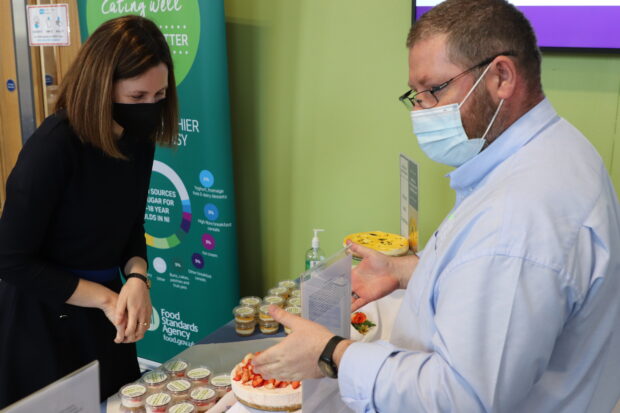
The FSA’s Eating Well Choosing Better Programme supports all sectors of the Northern Ireland food industry to reduce the calorie, sugar, saturated fat and salt content of food and drink, as well as reducing portion size to help consumers make healthier choices.
All things cheesecake, one of Northern Ireland’s favourite desserts, will be celebrated on International Cheesecake Day on Saturday 30 July 2022. Despite its popularity, this dessert often contains high levels of calories, sugar, saturated fat and salt.
Cheesecake reformulation
A nutritional analysis survey of cheesecake sold in hotels and restaurants throughout Northern Ireland found that portion sizes are often very large and that the average portion provided:
- 534kcal - over one-quarter of the average recommended daily calorie intake
- 27g of sugar - equivalent to 5 and a half sugar cubes
- and 22.4g of saturated fat - women should not eat more than 20g of saturated fat per day and men should not eat more than 30g of saturated fat per day.
Findings such as these are worrying, as obesity continues to be one of the most important public health challenges facing Northern Ireland, with 62% of adults and 27% of children aged 2-15 years classified as overweight or obese.
Reformulating food and drink products to reduce calories, saturated fat, sugar, and salt can help consumers to make healthier choices and help food businesses tap into the growing health and wellness trend. A consumer poll conducted by Ipsos MORI on behalf of the FSA found that over 3 in 5 consumers would like to change their diet to make it healthier (63%); with 68% agreeing they would like to eat more fruit and vegetables and 61% wanting to reduce their calorie intake.

Our Food and You 2 Survey reported that 63% of consumers are concerned about the amount of sugar in food. It is therefore not surprising that 64% of Northern Ireland consumers would be more likely to buy food reduced in sugar and half would be more likely to buy food reduced in saturated fat and salt compared to the regular version. The food industry, therefore, has a crucial role to play not only in providing consumers with products that meet their expectations in terms of taste, quality and convenience but also in providing healthier products lower in calories, sugar, saturated fat and salt.
Cheesecake reformulation technical guidance
No single food or drink product can be held responsible for the obesity crisis. However, each product can contribute to reducing obesity if it is reformulated to be healthier.
As part of the Eating Well Choosing Better Programme, we recently worked in partnership with the College of Agriculture Food and Rural Enterprise in Northern Ireland to host a cheesecake reformulation workshop in March 2022. This workshop launched technical guidance developed to support food businesses produce cheesecake which meets the UK Government’s guidelines for calories, sugar and salt.
Recipe resources were also developed to support food businesses to use the advice contained in the guidance. Delegates from the manufacturing, retail and catering sectors who attended the reformulation workshop were given copies of the guidance and recipe resources to use in their businesses. If you would like to receive a copy of the guidance and recipe resources, then please email me.
Have a look at our scone reformulation technical guidance and healthier catering guides for further support on improving the nutritional profile of scones and food served in a range of settings outside the home. We are also happy to provide copies of this guidance.
We publish a bi-annual Eating Well Choosing Better newsletter for Northern Ireland's food manufacturers, caterers, and retailers to provide the latest updates on policy development, reformulation guidance and consumer insights. Sign up here to receive future editions of the newsletter.
Leave a comment